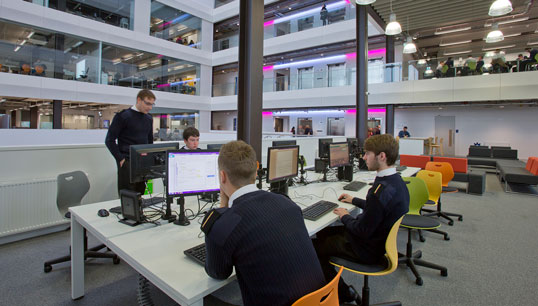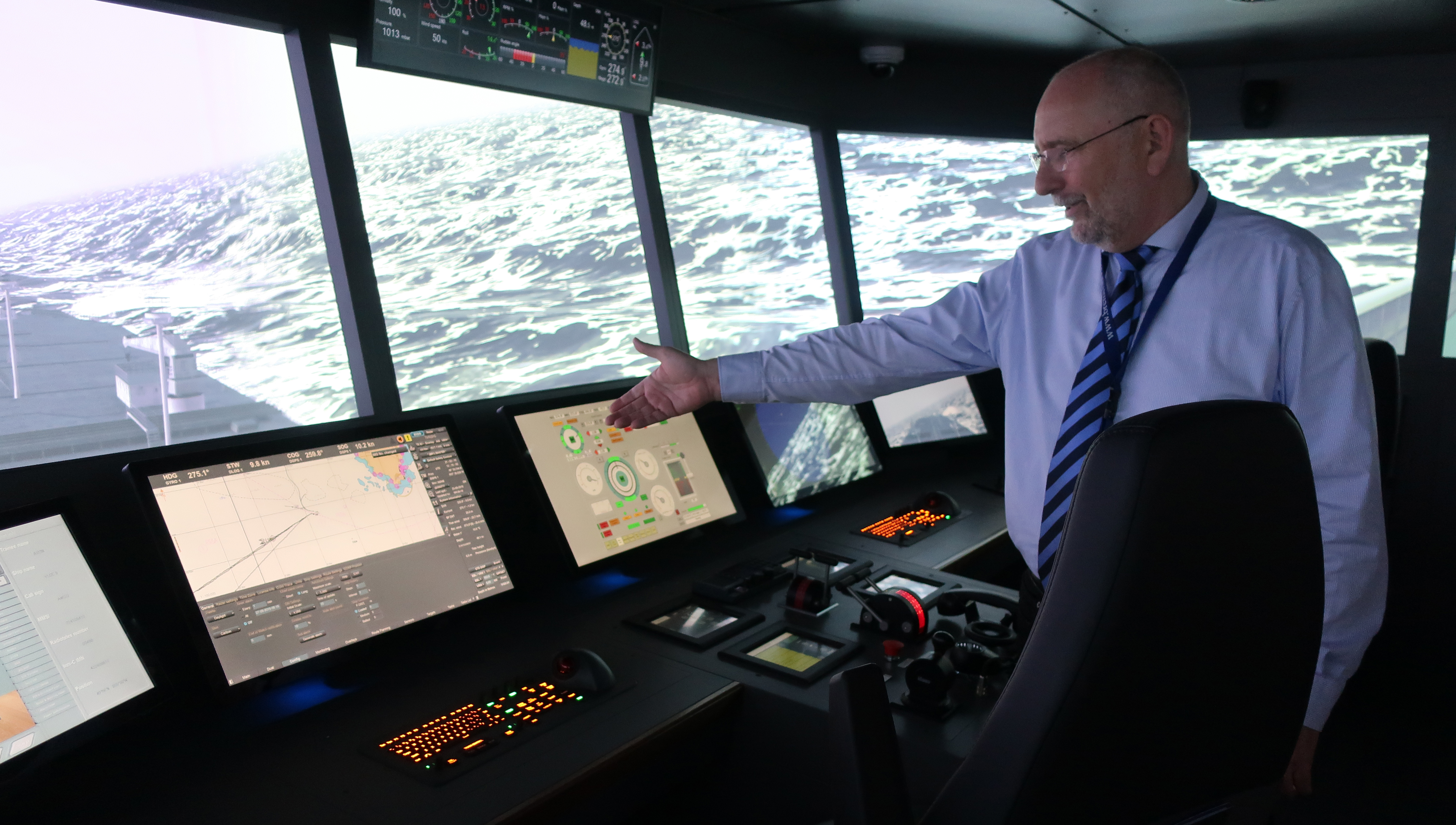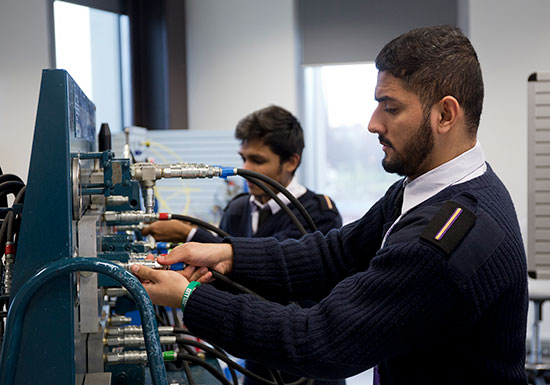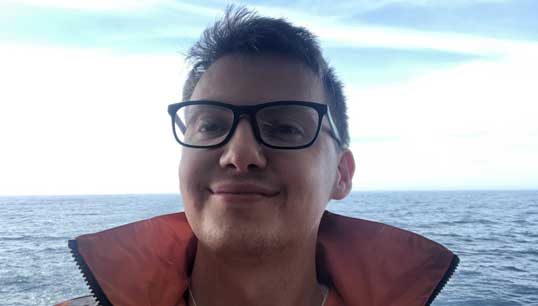- Topics
- Campaigning
- Careers
- Colleges
- Community
- Education and training
- Environment
- Equality
- Federation
- General secretary message
- Government
- Health and safety
- History
- Industrial
- International
- Law
- Members at work
- Nautilus news
- Nautilus partnerships
- Netherlands
- Open days
- Opinion
- Organising
- Switzerland
- Technology
- Ukraine
- United Kingdom
- Welfare
Maritime colleges adapt to the 'new normal' amid Covid 19 restrictions
16 September 2020

Blended learning and a flexible approach to seatime mean cadets can continue their studies wherever they are, Ben Powell reports
Reduced group sizes and an increased reliance on online teaching methods are among the measures adopted by UK maritime colleges to get back to business this term while they continue to grapple with the practicalities of preparing cadets for a life at sea during a global pandemic.
As the realities of social distancing and infection control become embedded in day-to-day life, principals have been searching for their own answers to the fundamental question of what makes a college a college?
Networking, hands-on exercises and group work have long been key elements of the cadet experience, and are at the core of an offer which builds practical skills alongside knowledge of theory. Maritime colleges have been exploring a multitude of options to ensure that as rounded and enriching an experience as possible continues to be offered, while safeguarding the safety of cadets and staff.
With local regulations varying across the UK and differences in the physical infrastructure available at each college, a range of approaches are being offered by institutions and arrangements are subject to change at short notice.
South Shields Marine School, South Tyneside College
'It is extremely important to build the relationship with cadets', said South Shields Marine School principal Simon Ashton, explaining the blended approach to learning currently being offered by the college.
Following a lockdown period which necessitated a move to almost all learning being undertaken online, the college has now focused on ensuring that students can return to the classroom, with a focus on new cadets.
'With phase one, we are trying to get them all in for at least some time in the classroom,' said Mr Ashton 'Remote learning works so much more effectively after the initial relationships have been built.'
Social distancing rules have clearly impacted on the way that courses can be delivered, as well as the number of students who can be together at any one time. This has led to the college introducing parallel teaching, where a lesson taking place in the classroom is broadcast simultaneously online for students who are not able to be in the room.
Alongside staggered starting times, reduced group sizes, regular wellbeing briefings and practical social distancing measures such as one-way systems, this has allowed South Shields to provide students with a college experience which resembles the pre-Covid world as closely as possible. The college also welcomed the government U-turn allowing for the use of face coverings in areas where social distancing is not possible to safeguard staff and students.
However, with so much uncertainty remaining over the prospect of new local or even national lockdown measures being introduced, Mr Ashton stressed the requirement to be as flexible as possible for each student.
Warsash Maritime School, Solent University
While several colleges are now bringing cadets back on premises, Warsash is continuing to offer an approach which is predominantly delivered online. However, the college stresses that: 'This is not distance learning where students are largely left to fend for themselves,' setting out that 'a range of additional support is being made available via Microsoft Teams, Zoom, phone and email.'

For the physical aspects of the training process, Warsash has reopened simulators, engineering workshops, ETO laboratories, and safety training facilities such as the fire ground and pool. However, the college told us that steps are being taken to ensure the safety of students: 'There are activity-based risk assessments for each of these courses and strict social distancing measures are in place, including the use of all necessary personal protective equipment. In order to comply with social distancing, we have halved the capacity on each course and are running more courses instead.'
UKSA
Following extensive planning, the Isle of Wight-based yacht college UKSA was accredited by the MCA to be able to resume the delivery and examination of yacht training modules in July. Director of training and operations Chris Frisby explained: 'The team have been diligently rewriting lesson plans and notes for each course, which have all been approved by the MCA. Theory courses are now delivered online, via Zoom, from two new dedicated virtual classrooms in our training centre'.
Students can choose to study on site, in single en suite rooms, or remotely, but they need to attend physically to take any exams or practical assessments. Courses with practical elements are delivered on site, with student 'bubbles' and reduced class sizes to ensure students are able to maintain social distancing within classrooms.
Feedback from students to the online delivery of theory courses has so far been largely positive, with one student commenting: 'I was a bit concerned to be doing a fairly intensive course over Zoom, but day one has put those concerns to rest,' and others commending tutors for keeping the energy up despite having 'only muted faces staring back' on the online platform.
The physical and mental wellbeing of students has remained a priority for UKSA throughout, with welfare officer Kim Fry explaining: 'After months of isolation and uncertainty, it is imperative that students have the tools to identify when they need support and the confidence to ask for help'.
It's obviously been a massive challenge for colleges but the quality of lecture hasn't changed. The lecturers are still there, they are still accessible and if you have any problems, they are responsive. David Pirie, Nautilus Champion and Glasgow cadet
City of Glasgow College
City of Glasgow College made the decision to close its buildings on 17 March, ahead of the nationwide lockdown at a time when the virus was escalating rapidly and allowed travel home and repatriation for its cadets.

'With blended learning capacity already a feature, our college moved swiftly to an on-line delivery model,' said Mark Stagg, dean for the Faculty of Nautical and STEM at the college. 'As our college teaches nautical students remotely across the globe, we were well positioned in terms of material and capability to move to on-line provision and have been utilising a range of software to deliver synchronous learning events.'
In a similar way to Warsash, as campus buildings reopen, Glasgow has been prioritising practical teaching and learning in particular short courses, simulation, and workshops that cannot be delivered online.
'One of the big challenges across the education sector during lockdown' said Mr Stagg, 'was losing the ability to conduct traditional closed book assessments and exams.
'A lot of work was undertaken to develop and implement alternative assessment methods including project work and on-line oral assessment. The college worked closely with the Maritime and Coastguard Agency (MCA) and Scottish Qualifications Authority to develop suitable alternative methodologies that enabled students to complete units or courses.'
David Pirie, Nautilus Champion
Overall, colleges told Nautilus that students have been understanding of the changes that have been made and feedback has been positive – a view shared by Glasgow cadet and Nautilus Champion David Pirie.

'It's obviously been a massive challenge for them, but the quality of lecture hasn't changed,' he said. 'The lecturers are still there, they are still accessible and if you have any problems, they are responsive.'
However, while it can be more convenient at times, he explained that distance learning comes with its own unique problems: 'I've been worrying about the chart work and trying to find all of that space on the floor for it.
'For certain subjects, it's no problem whatsoever, but obviously for things like chart working it would be a lot better to be there in person, with a lecturer or an ex-captain there advising you on your mistakes.'
He continued: 'But the hardest part is probably the same as working from home, in that it can be a lot harder to get focused and motivated to sit down and do your work when you're surrounded with the comforts of home and its distractions.'
Seatime
While adjusting to new methods of teaching has been a challenge for colleges, it is arguably the provision of time at sea that will prove most difficult. From the crew change crisis to a steep reduction in the number of cruises, some cadets have found opportunities offered or taken away at very short notice.
'In some cases, the ships are not sailing and therefore there is no training berth available, so it may therefore be better for the cadet to carry on studying if no alternative seatime can be found,' Warsash told Nautilus. 'In other cases, there may be the sudden opportunity to gather sea time, in which case it may be beneficial to cadet to grab the opportunity and carry on with the studies later.
'We are working very closely with each cadet sponsor to establish what the best outcome for the cadet is. The overriding principle is to create as little delay to the cadet's career progression as possible.'
A similar approach has been at City of Glasgow College, with students unable to secure seatime able to change the phasing of their course: 'Many nautical students were unable to travel to join ships for seatime, or to return home to resume studies or take leave. The college has worked with regulators and awarding bodies to put in interim measures including remote working and, for Phase 1 cadets unable to proceed to sea, a temporary programme structure that allowed them to progress straight to their next college phase and carry forward the seatime requirements.'
- The UK Maritime & Coastguard Agency has proposed a trial programme of simulator training in return for limited sea-time reductions. The trial will start in 2021 following a consultation period with industry stakeholders.
Tags
More articles
A catalyst for change in seafarer training
A century of literary education and enjoyment for Marine Society's ships' library service
See it to be it – how the Maritime Roadshow for Girls has encouraged more young women to consider maritime careers
Training for tomorrow's world – what's new with the SkillSea project
UK green lights simulator training for sea-time reductions
The UK has given the green-light to trial enhanced simulator training in return for limited sea-time reductions.
